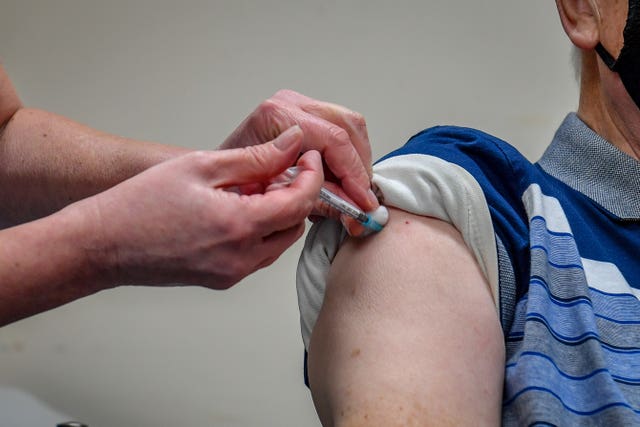
Scientists from across the world have created an online guide to help fight the spread of misinformation about the coronavirus vaccines.
The experts say the guide will arm people with practical tips, the latest information and evidence to talk reliably about the vaccines, constructively challenge associated myths, and allay fears.
Led by the University of Bristol, the scientists are appealing to everyone, from doctors to parents, to understand the facts, follow the guidance, and spread the word.
Lead author Professor Stephan Lewandowsky, of the University of Bristol, said: “Vaccines are our ticket to freedom and communication about them should be our passport to getting everyone on board.
“The way all of us refer to and discuss the Covid-19 vaccines can literally help win the battle against this devastating virus by tackling misinformation and improving uptake, which is crucial.
“That’s why we produced this handbook so everyone has the basics, as well as more comprehensive information, at their fingertips and can do their part in sharing facts, not fiction, to put us on the road to recovery rather than a path of further suffering.”
In a bid to combat conspiracy theories and other misleading claims being shared on social media, the Covid-19 Vaccine Communication Handbook sets out the facts, highlighting how the vaccines are overwhelmingly safe and effective.
Co-author Professor Adam Finn, a University of Bristol virologist who has played a key role in the Covid-19 vaccine developments, said: “Accurate information about vaccines is becoming harder to distinguish from convincing but misleading fiction.
“This reduces uptake and so their impact on public health and harms us all. Although vaccines enjoy majority support that politicians can only dream of, we can no longer take this for granted.
“It’s time to take the initiative in ensuring people are not duped into making wrong decisions that harm them, their children and their communities.”

Topics in the handbook include public behaviour and attitudes, policy, facts, and misinformation.
Co-author Julie Leask, a social scientist and Professor at the University of Sydney who chairs one of the World Health Organisation working groups on vaccinations, said: “The safest and most effective vaccines against Covid-19 are of no use if people cannot, or will not, take them.
“This handbook comes at a crucial time – when people around the world are deciding whether or not they will accept a Covid-19 vaccine. More than ever, we need to be communicating effectively and the handbook brings the science of communication to the communicators.”
Professor Lewandowsky added: “It’s important to challenge and debunk misinformation in a positive, constructive manner.
“I encourage people to approach this by providing a truth sandwich – start with the key facts, including that the vaccines have been shown to be 95% effective and have been comprehensively tested without cutting any corners.
“Then address the misinformation.
“For instance, if people say the vaccine can’t have been tested properly because it was developed so quickly, explain why this isn’t the case.
“Given the severity of the pandemic, more resources and expertise than ever were dedicated to this effort.
“Due to its high profile, volunteers for the trials were recruited much faster than usual.
“The Ebola vaccine effectively took 10 months from initial testing to trials in the field, so this has been done before. Then finally reiterate the facts so they stay fresh mind.”
– The guide can be accessed at https://sks.to/c19vax


Why are you making commenting on The Herald only available to subscribers?
It should have been a safe space for informed debate, somewhere for readers to discuss issues around the biggest stories of the day, but all too often the below the line comments on most websites have become bogged down by off-topic discussions and abuse.
heraldscotland.com is tackling this problem by allowing only subscribers to comment.
We are doing this to improve the experience for our loyal readers and we believe it will reduce the ability of trolls and troublemakers, who occasionally find their way onto our site, to abuse our journalists and readers. We also hope it will help the comments section fulfil its promise as a part of Scotland's conversation with itself.
We are lucky at The Herald. We are read by an informed, educated readership who can add their knowledge and insights to our stories.
That is invaluable.
We are making the subscriber-only change to support our valued readers, who tell us they don't want the site cluttered up with irrelevant comments, untruths and abuse.
In the past, the journalist’s job was to collect and distribute information to the audience. Technology means that readers can shape a discussion. We look forward to hearing from you on heraldscotland.com
Comments & Moderation
Readers’ comments: You are personally liable for the content of any comments you upload to this website, so please act responsibly. We do not pre-moderate or monitor readers’ comments appearing on our websites, but we do post-moderate in response to complaints we receive or otherwise when a potential problem comes to our attention. You can make a complaint by using the ‘report this post’ link . We may then apply our discretion under the user terms to amend or delete comments.
Post moderation is undertaken full-time 9am-6pm on weekdays, and on a part-time basis outwith those hours.
Read the rules here